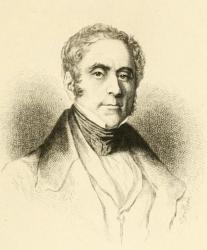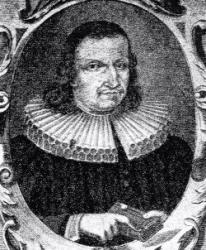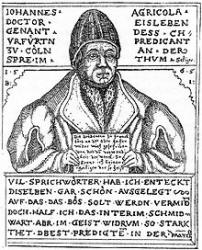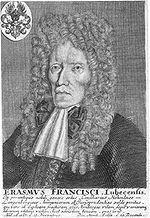Planning worship?
Check out our sister site, ZeteoSearch.org,
for 20+ additional resources related to your search.
- |
User Links
Person Results
‹ Return to hymnal




Export as CSV
Israel Clauder
Hymnal Number: 558 Author of "Mein Gott, du weisst am allerbesten" in Vollständiges Marburger Gesang-Buch
Israel Clauder
Michael Altenburg

1584 - 1640 Person Name: Johann M. Altenburg Hymnal Number: 289 Author of "Verzage nicht, du [o] H'uflein klein" in Vollständiges Marburger Gesang-Buch Altenburg, Johann Michael, b. at Alach, near Erfurt, on Trinity Sunday, 1584. After completing his studies he was for some time teacher and precentor in Erfurt. In 1608 he was appointed pastor of Ilversgehofen and Marbach near Erfurt; in 1611, of Troch-telborn; and in 1621 of Gross-Sommern or Som-merda near Erfurt. In the troublous war times he was forced, in 1631, to flee to Erfurt, and there, on the news of the victory of Leipzig, Sept. 17, 1631, he composed his best known hymn. He remained in Erfurt without a charge till, in 1637, he was appointed diaconus of the Augustino Church, and, in 1638, pastor of St. Andrew's Church. He d. at Erfurt February 12, 1640 (Koch, iii. 115-117 ; Allg. Deutsche Biog., i. p. 363, and x. p. 766—the latter saying he did not go to Erfurt till 1637). He was a good musician, and seems to have been the composer of the melodies rather than of the words of some of the hymns ascribed to him. Two of his hymns have been tr. into English, viz. :—1. Aus Jakob's Staxnm ein Stern sehr klar. [Christmas.] Included as No. 3 of his Christ-liche liebliche und anddchtige newe Kirchen- und Hauss-Gestinge, pt. i., Erfurt, 1G20, in 3 st. of 5 1. According to Wetzel's A. H., vol. i., pt. v. p. 41, it was first pub. in J. Forster's Jlohen Festtags-Schreinlein, 1611. In the Unv. L. S., 1851, No. 24. It has been tr. as " From Jacob's root, a star so clear," by Miss Manington, 1864, p. 13.2. Verzage nicht du Hauflein klein. [In Trouble.] Concerning the authorship of this hymn there are three main theories—i. that it is by Gustavus Adolphus; ii. that the ideas are his and the diction that of his chaplain, Dr. Jacob Fabricius; and iii. that it is by Altenburg. In tracing out the hymn we find that:—The oldest accessible form is in two pamphlets published shortly after the death of Gustavus Adolphus, viz., the Epicedion, Leipzig, n.d. but probably in the end of 1632 [Royal Library, Berlin]: and Arnold Mengering's Blutige Siegs-Crone, Leipzig, 1633 [Town Library, Hamburg]. In the Epicedion the hymn is entitled, " Konig-licher Schwanengesang So ihre Majest. vor dem Ltltzen-schen Treffen inniglichen zu Gott gesungen "; and in the Siegs-Crone, p. 13, "Der S. Kon. Mayt. zu Schweden Lied, welches Sie vor der Schlacht gesungen." In both cases there are 3 sts. :—i. Verzage nicht, du Hiiuffiein klein. ii. Triistedich dess, dass deine Sach. iii. So wahr Gott Gott ist, und sein Wort.The next form is that in J. Clauder's Psalmodiae Novae Pars Tertia, Leipzig, 1636, No. 17, in 5 st. of 6 lines, st. i.-iii. as above, and—iv. Ach Gott gieb in des deine Gnad v. Hilff dass wir auch nach deinem Wort. No author's name is given. In the Bayreuth G. B., 1668, p. 266, st. iv., v., are marked as an addition by Dr. Samuel Zehner; and by J. C. Olearius in his Lieder-Schatz, 1705, p. 141, as written in 1638 (1633 ?), when the Croats had partially burnt Schleusiugen, where Zehner was then superintendent.The third form of importance is that given in Jcremias Weber's Leipzig G. B., 1638, p. 651, where it is entitled " A soul-rejoicing hymn of Consolation upon the watchword—God with us—used by the Evangelical army in the battle of Leipzig, 7th Sept., 1631, composed by M. Johann Altenburg, pastor at Gross Soinmern in Dtiringen," [i.e. Sommerda in Thuringia]. It is in 5 sts., of which sts. i.-iii. are the same as the 1633, and are marked as by Altenburg. St. iv., v., beginning— iv. Drilmb sey getrost du kleines Heer v. Amen, das hilff Ilerr Jesu Christ, are marked as " Additamentum Ignoti." This is the form in C. U. as in the Berlin G. L. S., ed. 1863, No. 1242.In favour of Altenburg there is the explicit declaration of the Leipzig G. B., 1638, followed by most subsequent writers. The idea that the hymn was by Gustavus Adolphus seems to have no other foundation than that in many of the old hymn-books it was called Gustavus Adolphus's Battle Hymn. The theory that the ideas were communicated by the King to his chaplain, Dr. Fabricius, after the battle of Leipzig, and by Fabricius versified, is maintained by Mohnike in his Hymnologische Forschungen, 1832, pt. ii. pp. 55-98, but rests on very slender evidence. In Koch, viii. 138-141, there is the following striking word-picture:—If, then, we must deny to the hymn Albert Knapp's characterisation of it as " a little feather from the eagle wing of Gustavus Adolphus," so much the more its original title as his "Swan Song" remains true. It was on the morning of the 6 Nov., 1632, that the Catholic army under Wallenstein and the Evangelical under Gustavus Adolphus stood over against each other at Lutzen ready to strike. As the morning dawned Gustavus Adolphus summoned his Court preacher Fabricius, and commanded him, as also the army chaplains of all the other regiments, to hold a service of prayer. During this service the whole host sung the pious king's battle hymn—" Verzage nicht, du Hauflein klein."He himself was on his knees and prayed fervently. Meantime a thick mist had descended, which hid the fatal field so that nothing could be distinguished. When the host had now been set in battle array he gave them as watchword for the fight the saying, "God with us," mounted his horse, drew his sword, and rode along the lines of the army to encourage the soldiers for the battle. First, however, he commanded the tunes Ein feste Burg and Es wollt tins Gott genadig sein to be played by the kettledrums and trumpets, and the soldiers joined as with one voice. The mist now began to disappear, and the sun shone through. Then, after a short prayer, he cried out: " Now will we set to, please God," and immediately after, very loud, " Jesu, Jesu, Jesu, help me today to fight for the honour of Thy Holy Name." Then he attacked the enemy at full speed, defended only by a leathern gorget. " God is my harness," he had said to the servant who wished to put on his armour. The conflict was hot and bloody. About 11 o'clock in the forenoon the fatal bullet struck him, and he sank, dying, from his horse, with the words, “My God, my God!" Till twilight came on the fight raged, and was doubtful. But at length the Evangelical host obtained the victory, as it had prophetically sung at dawn."This hymn has ever been a favourite in Germany, was sung in the house of P. J. Spener every Sunday afternoon, and of late years has been greatly used at meetings of the Gustavus Adolphus Union—an association for the help of Protestant Churches in Roman Catholic countries. In translations it has passed into many English and American collections.
Translations in C. U.:—
Fear not, 0 little flock, the foe. A good tr. from the text of 1638, omitting st. iv., by Miss Winkworth, in her Lyra Ger., 1855, p. 17. Included, in England in Kennedy, 1863, Snepp's S. of G. and G., 1871, Free Church H. Bk., 1882, and others; and in America in the Sabbath H. Book., 1858, Pennsylvania Luth. Ch. Bk., 1868, Hys. of the Church, 1869, Bapt. H. Bk., 1871, H. and Songs of Praise, 1874, and many others.
Be not dismay'd, thou little flock. A good tr. of st. i.-iii. of the 1638 text in Mrs. Charles's V. of Christian Life in Song, 1858, p. 248. She tr. from the Swedish, which, in the Swensha Psalm Boken, Carlstadt, N.D. (1866), is given as No. 378, "Forfaras ej, du lilla hop !" and marked Gustaf II. Adolf. Her version is No. 204 in Wilson's Service of Praise, 1865.
Thou little flock, be not afraid. A tr. of st. i.-iii. from the 1638 text, by M. Loy, in the Ohio Luth. Hymnal, 1880, No. 197.
Other trs. are all from the text of 1638.(1.) " Be not dishearten'd, little flock," by Dr. II. Mills, 1856, p. 121. (2.) " Despond not, little band, although," by Dr. G. Walker, 1860, p. 41. (3.) "Be not dismay'd, thou little flock, Nor," by E. Massie, 1866, p. 143. (4.) " 0 little flock, be not afraid," in J. D. Burns's Memoir and Remains, 1869. p. 226.
–John Julian, Dictionary of Hymnology (1907)
Michael Altenburg
Heinrich Caesar
1627 - 1669 Hymnal Number: 350 Author of "In dieser abendstunde" in Vollständiges Marburger Gesang-Buch Cäsar, Heinrich, was born at Greussen in Thuringia, c. 1597, and became diaconus at Labiau, East Prussia, in 1624. He was instituted Feb. 25, 1627, as pastor at Loewenhagen, near Königsberg (Löwenhagen or Leuenhagen), and died there, in his 72nd year, Aug. 11, 1669 (manuscript from Pastor Winkler of Loewenhagen). The hymn:
In dieser Abendstunde, erheb ich. [Evening], appeared with his name in the New Preussisches vollstandiges Gesang-Buch, Königsberg, 1650, p. 650, in 16 stanzas, and J. Crüger's Praxi, 1648, No. 22. Sometimes erroneously ascribed to Conrad Huober, of Strassburg. It is translated as, "In this the evening hour," by H. J. Buckoll, 1842, p. 9. [Rev. James Mearns, M.A.]
--John Julian, Dictionary of Hymnology (1907)
Heinrich Caesar
Johann Hoefel
1600 - 1683 Person Name: J. Hoefel Hymnal Number: 463 Author of "O suesses Wort das Jesus spricht" in Vollständiges Marburger Gesang-Buch Höfel, Johann, was born June 24, 1600, at Uffenheim, in Franconia, and studied at the Universities of Giessen, Jena, and Strassburg, becoming in 1628 Doctor of Law at Jena. In 1633 he settled in Schweinfurt as a consulting lawyer, and died there Dec. 8, 1683 (Wetzel, i. 435-436, and A. H. ii., 285-291). One of his hymns has been translated into English:—
0 süsses Wort das Jesus spricht . Cross and Consolation . Founded on St. Luke vii. 13. Included as No. 461 in the Coburg Gesang-Buch, 1655 [Göttingen University Library], in 11 stanzas of 4 lines, entitled, "The sweet saying of Jesus, ’Weep not,' Luke vii." According to Koch , iii. 141, it had previously appeared in his Musica Christiana, 1634. Translated as "Oh, sweetest words that Jesus could have sought," by Mrs. Findlater, in Hymns from the Land of Luther 1855, p. 8 (1884, p. 75). (Rev. James Mearns, M.A.]
-- John Julian, Dictionary of Hymnology
Johann Hoefel
Karl Friedrich Lochner

1634 - 1697 Hymnal Number: 506 Author of "Was gibst du denn, o meine Seele" in Vollständiges Marburger Gesang-Buch Born: April 2, 1634, Nürnberg, Germany.
Died: February 25, 1697, Fürth, Bavaria.
Buried: Fürth, Bavaria.
A Lutheran pastor and scholar, Lochner earned his master’s degree, then became a professor. His father then encouraged him to return home, where he lectured in logic and metaphysics. A higher calling changed his life’s work. First he became a vicar at Wöhrd, then a vicar at Fürth under Pastor Schuster. In 1663, upon Schuster’s death, he succeeded as pastor, and held the office for 36 years.
Lyrics:
Was gibt du denn, o meine Seele
Soul, What Return Has God, Thy Savior
http://www.hymntime.com/tch/bio/l/o/c/lochner_kf.htm
Karl Friedrich Lochner
Symphorianus Pollio
Hymnal Number: 97 Author of "Mein See' erhebt den Herren mein, Mein Geist" in Vollständiges Marburger Gesang-Buch Pollio, Symphorianus, originally called Altbiesser or Althiesser, was a native of Strassburg, and was for some time in clerical work at Kosheim, near Strassburg. In 1507 we find him as one of the priests attached to St. Stephen's church at Strassburg. He was thereafter at St. Martin's in Strassburg, and being very popular as a preacher was appointed, in 1522, by the Chapter as interim preacher at the Cathedral. The Chapter hoped he would counteract the influence of Matthias Zell, but as he preached quite as evangelically as Zell, he was soon sent back to St. Martin's. When, in 1524, he married his housekeeper, the Chapter tried to deprive him of his living, but by the help of the burgesses he continued in St. Martin's till the church had to be taken down in 1529. Thereafter he officiated as pastor of the church "Zu den guten Leuten," outside the city walls, and was still there at the Visitation of 1533. The date of his death is unknown (G. H. A. Kittelmeyer's Die evangelischen Kirchenliederdichter des Elsasses, Jena, 1855, p. 17 ; Allgemeine Deutsche Biographie xxvi. 395, &c). In the early Strassburg hymn-books there are paraphrases of the Lord's Prayer and of the Magnificat by Pollio. The latter is:—
Mein Seel erhebt den Herren mein. The Magnificat. In Ordenung und ynhalt Teütscjier Mess un Vesper, Strassburg, 1524, and thence in Wackernagel, iii., p. 509, in 4 st. of 10 1. The translations are: (1) "My soul doth magnyfie the Lorde," by Bisop Coverdale, 1539 (Remains, 1846, p. 565). (2) "My saule dois magnifie the Lord." In the Gude and Godlie Ballates, ed. 1568, f. 73 (ed. 1868, p. 125). [Rev. James Mearns, M.A.]
-- John Julian, Dictionary of Hymnology (1907)
Symphorianus Pollio
Joachim Sartorius
Person Name: J. Sartorius Hymnal Number: 169 Author of "Lobet den herren ihr heiden all'" in Vollständiges Marburger Gesang-Buch
Joachim Sartorius
Johann Agricola

1494 - 1566 Person Name: Johannes Agricola Hymnal Number: 73 Author of "Froehlich wollen wir Halleluja singen" in Vollständiges Marburger Gesang-Buch Agricola, Johann or Johannes (latinized from Schneider, (Schnitter) or Sartor, also called Magister Islebius), born April 20, 1492, at Eisleben, where his father was a tailor. During his University course at Wittenberg, Luther took a great interest in him, entertained him at his own table, took him with him to Leipzig for the disputation, in 1519, with Dr. Eck, and in 1525 procured for him the position of Rector of St. Andrew's School at Eisleben, and preacher at St. Nicholas's Church there. He remained in Eisleben till 1536, working hand in hand with Luther; but after his removal to Wittenberg, in 1536, as one of the lecturers in the University, he developed Antinomian views, and, in 1537, published a series of theses which Luther answered in six disputations, 1538-40. On his appointment as Court Preacher at Berlin, in 1540, he formally renounced these opinions, and professed adherence to Wittenberg orthodoxy. But after his subsequent appointment as General Superintendent of the Mark, he gradually not only sought the esteem of the great, but, in order to gain the favour of the Emperor, joined with two representatives of the Romish Church in drawing up a Formula of Union (The Interim) which was presented to the Imperial Diet, held at Augsburg, and adopted by the Diet on May 15, 1548. By this action he disgusted the Lutherans, and procured for himself only discredit. He died at Berlin, Sept. 22, 1566. He was one of the best preachers of his time, and compiled one of the earliest collections of German Proverbs, first published at Zwickau, 1529 [the British Museum copy was printed at Hagenau, 1529] ( Koch, i. 278-281. Allgemeine Deutsche Biographie, i. 146-48).
Four hymns by him appeared in the early Lutheran hymnbooks, two of which were retained by Luther in Babst's Gesangbuch, Leipzig, 1545.
1. Ich ruf zu dir, Herr Jesu Christ. [ Supplication.] Wackernagel, iii. pp. 54-55, gives two forms of this, in 5 stanzas of 9 lines, the first from Geistliche Lieder, Erfurt, 1531, the second from an undated broadsheet before 1530, entitled, "A new hymn of supplication for Faith, Love, and Hope, and for a Holy Life; composed by John of Eisleben, preacher to John Duke of Saxony." Fischer, i. 345, refers to the Nürnberg broadsheet, c. 1526, quoted in Wackernagel's Bibliographie, 1855, p. 89, and adds that in his opinion the disfavour into which Agricola fell after the outbreak of the Antinomian controversy caused the suppression of his name in the hymn-books. After appearing in Klug's Geistliche Lieder, 1529, the hymn was included in almost all subsequent hymn-books, and so recently as No. 379 in the Unverfälschter Liedersegen, 1851.
It is sometimes erroneously ascribed to Paulus Speratus, an assumption originating with the Riga Gesang-buch of 1664. It was a favourite hymn of Valerius Herberger, of P. J. Spener (who requested it to be sung at his deathbed), and of many others.
Translations in common use:—
1. Lord Jesu Christ, I cry to Thee. A good translation, omitting stanza iv., by A. T. Russell, as No. 200 in his Psalms & Hymns, 1851.
2. Lord, hear the voice of my complaint. A full and very good translation as No. 116 by Miss Winkworth in her Chorale Book for England, 1863.
Other translations are:—
(1) “I call on the, Lorde Jesu Christ," by Bp. Coverdale, 1539 ( Remains, 1846, p. 560), repeated, slightly altered, in the Gude and Godly Ballates (ed. 1568, folio 34), ed. 1868, p. 57. (2) "I cry to Thee, my dearest Lord," by J. C. Jacobi, 1122, p. 68; in his edition, 1732, p. 114, altered to "To Thee, 0 Lord, I send my cries," and thence as No. 310 in pt. i. of the Moravian Hymn Book 1754; omitted in 1789 and 1801; in the Supplement of 1808, stanzas i., iv. were included as No. 1082, and repeated in later editions altered to "To Thee I send my fervent cries." (3) "I cry to Thee, 0 Christ our Lord!" by N. L. Frothingham, 1870, p. 205. [Rev. James Mearns, M.A.]
--John Julian, Dictionary of Hymnology (1907)
Johann Agricola
Erasmus Finx

1627 - 1694 Person Name: Erasmus Fink Hymnal Number: 503 Author of "O wie ist der Weg so schmal" in Vollständiges Marburger Gesang-Buch Finx, Erasmus, was b. at Lübeck, Nov. 19,1627. After studying law at various universities and acting for some time as travelling tutor, he settled, at Nürnberg as writer and corrector for the press, remaining there till his death, Dec. (Oct.?) 20, 1694.
Under the name of Francisci (from his father's Christian name of Francis) he published a large number of historical and religious works. Of his some 200 hymns, which mostly appeared interspersed in his devotional works, two have passed into English:—
i. 0 Herr gieb Acht. (Christian Warfare.] In his Ruhestunden, pt. iii. p. 1007, Leipzig, 1680, in 12 stanzas Translated as, "Lord, watch each hour," as No. 689 in pt. i. of the Moravian Hymn Book, 1754.
ii. 0 wie ist der Wag so schmal. [The Narrow Way. In his Gold-Kammer, pt. ii. p. 303, Nürnberg, 1668, in 8 stanzas. Translated as, "O how narrow is the way," by Miss Warner, 1858 (edition 1861, p. 445). [Rev. James Mearns, M.A.]
--John Julian, Dictionary of Hymnology (1907)
Erasmus Finx
Christina von Mecklenburg-Schwerin
Hymnal Number: 597 Author of "Das Elend weist du, Gott allein, das mir ist" in Vollständiges Marburger Gesang-Buch
Christina von Mecklenburg-Schwerin


 My Starred Hymns
My Starred Hymns


